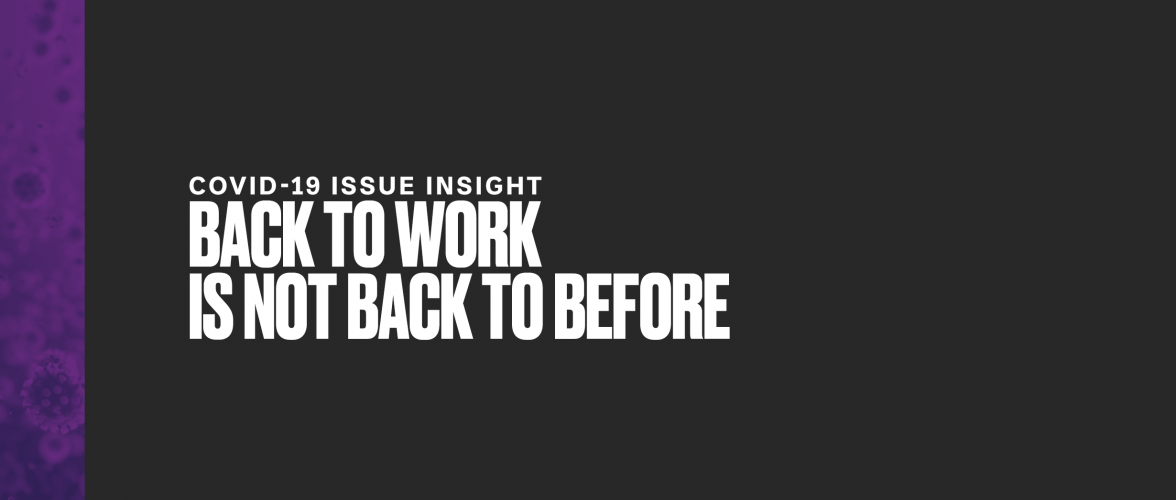COVID-19 Issue Insight Series | View as a PDF
Who it impacts
Every corporate leader, from CEO to intern manager | Anyone with decisionmaking power in an organization | All who have responsibility to consider the impact of COVID-19 on how their teams, partners, and communities show up to work in this time of turmoil
What we see
• 58% of Americans fear bringing COVID-19 home from work
• 27 million Americans depend on childcare to be able to do their job
• 60% of Americans say they expect the next five years to be characterized by “periods of widespread unemployment or depression”
• 44% of Americans say they talk about the coronavirus most or almost all of the time
• 67% of Americans don’t think the official U.S. death toll is accurate but Republicans and Democrats disagree on how. Among Democrats, 63% say the total undercounts reality while a plurality of Republicans say the figure is inflated.
What it means
You’re a health company now, and the stakes are higher.
Every decision a leader makes has to be viewed through the lens of health – the health of employees, customers, and every other stakeholder. The complexity of operating a business has increased as the COVID-19 crisis demands more of leaders and challenges them to think about health in the broadest of terms. Until employees feel safe at work – whether that’s at home or in the office – establishing a new normal will not be possible. And until an end is in sight for COVID-19, companies must organize around protecting the physical, emotional and mental well-being of their workforce – their success and the economy’s success depends on it.
We’re working to live, not “living to work.”
A societal shift in Americans’ relationship to work three decades in the making was cemented over the last three months. For even the most fortunate, COVID-19 has presented major roadblocks that have made getting through the day a challenge. For those who have lost their jobs, or worse, a loved one to the pandemic, this moment is profound. As Americans continue to reassess their priorities, leaders need to recognize and respond to the fact that a revolution has occurred in how employees view their responsibility to, and expectations of, their employer.
When death tolls are political, everything is political.
Even in the best of times, corporate leaders need to assume their actions will be evaluated under a political microscope. Today we’re a society wounded by COVID-19, rubbed raw by the civil unrest of late May and early June, and bracing for what is already a nasty election cycle. Leaders need to expect that meaning will be ascribed to their actions in unintended ways.
What you should do about it
Assume your answers are wrong, and listen to understand.
Successful business leaders and strategic communicators are often expected to – and rewarded for – generating quick solutions. This moment – at the intersection of a public health crisis, economic crisis and social justice crisis – is not one of those times. Understand you do not have all the answers, especially with employees, and especially as anxiety about the future deepens. Employees have long been considered a critical stakeholder, mostly in the sense that they can become advocates and ambassadors for a company. Today’s reality is that they can quickly become a company’s most influential detractor. Put employees at the center of thinking about establishing a new normal, listen intently, and then talk openly about what was heard to establish or build on the essential foundation of trust and respect necessary to weather stormy economic and political waters.
Scenario plan, and re-write the campaign plan.
Think of getting “back to work” or “establishing a new normal” within your organization like a 12-18 month political campaign. You know where you want to be on the other end of this crisis, you know who you’ve got to move to get there, and you know the resources you have at your disposal. What you don’t know is what your opposition (in this case COVID-19) will throw at you, or what other crises will emerge along the way. Take the time to think through the different types of challenges you may face, how you might be able to respond, and how your stakeholders may respond in kind, like always. But also spend time ensuring your approach to planning takes into account societal pressures and environmental factors that have experienced complete upheaval in recent months.
Take hold of the microscope.
No matter its size, industry, or history, every company should put itself through a process of thoughtful introspection in this highly politicized and polarized moment. As you talk about the ongoing process of getting back to work, first ensure that you actually have the ability to follow through on your commitments to employees, partners, and the communities in which you operate. Second, make sure anything you’ve done in the past that may seem at odds with the values and actions you now espouse are surfaced and managed. Success has always depended on building trust and acting authentically. Spring 2020 has raised that bar higher than ever before. Companies that mismanage this moment will not get a second chance at building credibility.
[1]Washington Post-Ipsos poll of US adults. N=8,086. April 27-May 4, 2020. Source.
[2] US Census Bureau: American Community Survey, Current Population Survey. Source.
[3] New York Times | Survey Monkey poll of US adults. N=5,733. May 4-10, 2020. Source.
[4] Pew Research Center’s American Trends Panel survey of US adults. N=10,139. April 20-26, 2020. Source.
[5] Axios-Ipsos Coronavirus Index survey of US adults. N=1,012. May 1-4, 2020. Source.
Purple is actively partnering with companies and industries to navigate the ever-changing COVID-19 pandemic and prepare for the future that will come after, bringing deep experience helping the world’s best-known companies navigate the world’s toughest challenges. Please reach out to author Nate Byer or any member of our Purple team to let us know how we can support you.

 What does corporate leadership look like in a divided nation?
What does corporate leadership look like in a divided nation?  Waiting to Engage in D.C. Is the Most Expensive Mistake You’...
Waiting to Engage in D.C. Is the Most Expensive Mistake You’...  The Era of High-Stakes Uncertainty
The Era of High-Stakes Uncertainty  What Forces are Shaping the Future for CMOs?
What Forces are Shaping the Future for CMOs?